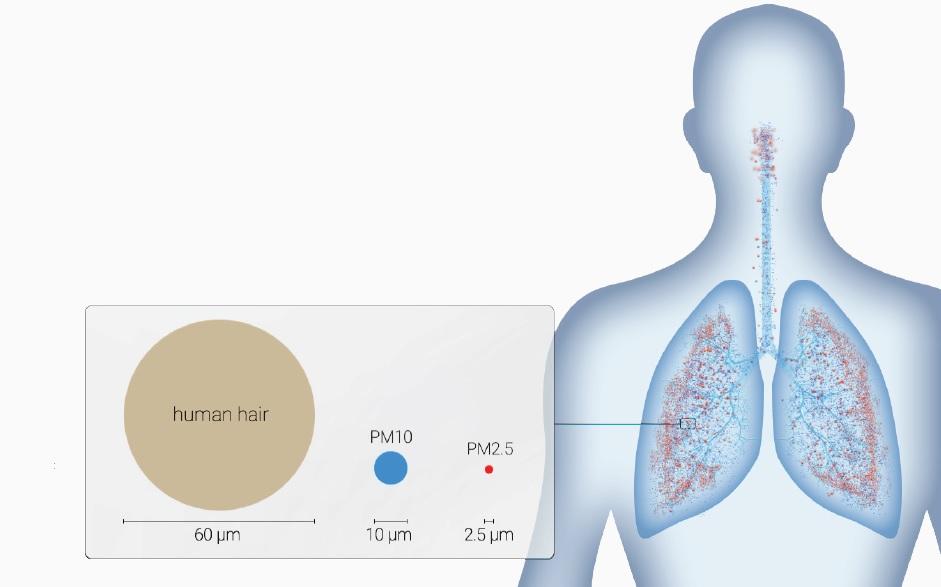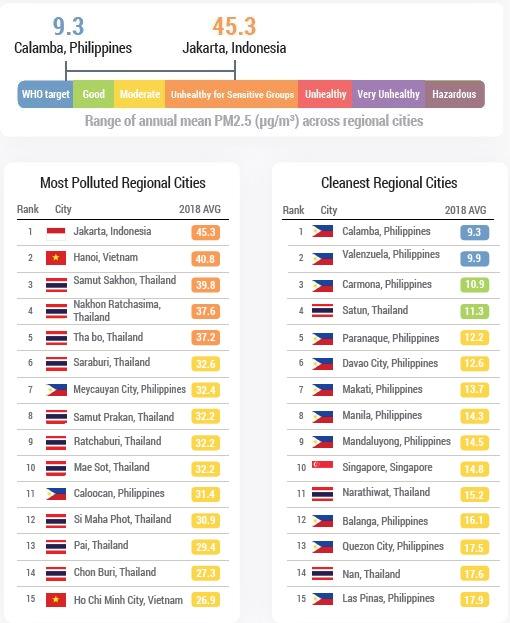Calamba tops list of cleanest Southeast Asian cities in terms of PM2.5 levels — report
NEW DELHI — New Delhi was the world's most polluted capital city in 2018, two groups monitoring air pollution said on Tuesday in a study of the amount of fine particulate matter known as PM2.5 in cities in 73 countries around the world.
The Indian capital, home to more than 20 million people, had an average of 113.5 micrograms of PM2.5 per cubic meter (μg/m³) of air in 2018, stratospherically above the World Health Organization's daily mean air quality guideline of 25 μg/m³.
In terms of cities overall, another Indian city topped the list: Gurugram, with an average of 135 μg/m³ in 2018.
The Philippines fared better, with Calamba, Laguna being rated the cleanest city in Southeast Asia in terms of average PM2.5 per cubic meter of air in 2018.
The study was conducted by IQ AirVisual, a Swiss-based group that gathers air quality data globally, and Greenpeace.
PM2.5
The report defines PM2.5 as "particulate matter (ambient airborne particles) which measure up to 2.5 microns in size, and has a range of chemical makeups and sources."

According to the report, "PM2.5 is widely regarded as the pollutant with the most health impact of all commonly measured air pollutants. Due to its small size, PM2.5 is able to penetrate deep into the human respiratory system and from there to the entire body, causing a wide range of short- and long-term health effects. Particulate matter is also the pollutant group which affects the most people globally.
"It can come from a range of natural as well as man-made sources. Common sources of PM include combustion (from vehicle engines, industry, wood and coal burning), as well as through other pollutants reacting in the atmosphere.
PM2.5 are so dangerous because they can lodge deep in the lungs.
PHL data
The Philippines ranked 48th in the list out of 73 countries in the study, with rank 1 (Bangladesh) being the worst and 73 (Iceland) being the best.
It was the second highest ranked Asian country on the list, after Japan (in 55th place).
In terms of PM2.5 per cubic meter of air, the Philippines was placed in the "moderate" category (12 to 20 PM2.5 per square meter) with an average of 14.62 μg/m³ in 2018.
Out of 62 world capital cities tested, Manila ranked 42nd, with a moderate 14.3 μg/m³ level in 2018.
The Philippines had the lowest μg/m³ levels among six Southeast Asian countries included in the survey: Cambodia, Indonesia, the Philippines, Singapore, Thailand, and Vietnam.
On the list of cleanest regional cities, the Philippines took 11 of the top 15 spots, with Calamba, Laguna in the top spot with a 9.3 average for 2018, followed by Valenzuela City (9.9).
Both cities are within the WHO PM2.5 target of 10 μg/m³.

The report noted that with government-supported PM2.5 monitoring being "relatively sparse" in Southeast Asia, "non-governmental measurements make up approximately half of the region’s coverage," including in the Philippines.
India and China
New Delhi's toxic air is caused by vehicle and industrial emissions, dust from building sites, smoke from the burning of rubbish and crop residue in nearby fields.
The city's average annual concentration of 113.5 PM2.5 in a cubic meter of air in 2018 is more than double the level of Beijing, which averaged 50.9 during the year, making it the eighth most polluted in the world.
China struggled for years to enforce environment rules and crack down on polluting industries, but it has benefited in recent years from vastly improved legislation and greater political will to combat poor air quality.
"In mainland China, in particular, this has led to significant improvements in year-on-year reductions in PM2.5 levels," the groups said in their joint study.
India is home to 15 of the 20 most polluted cities in the world, they said.
"The question which remains to be answered is whether there is enough political will to aggressively fight the health emergency India faces today and move away from polluting fuels and practices," said Pujarini Sen, spokeswoman for Greenpeace India. — Reuters/BM, GMA News



